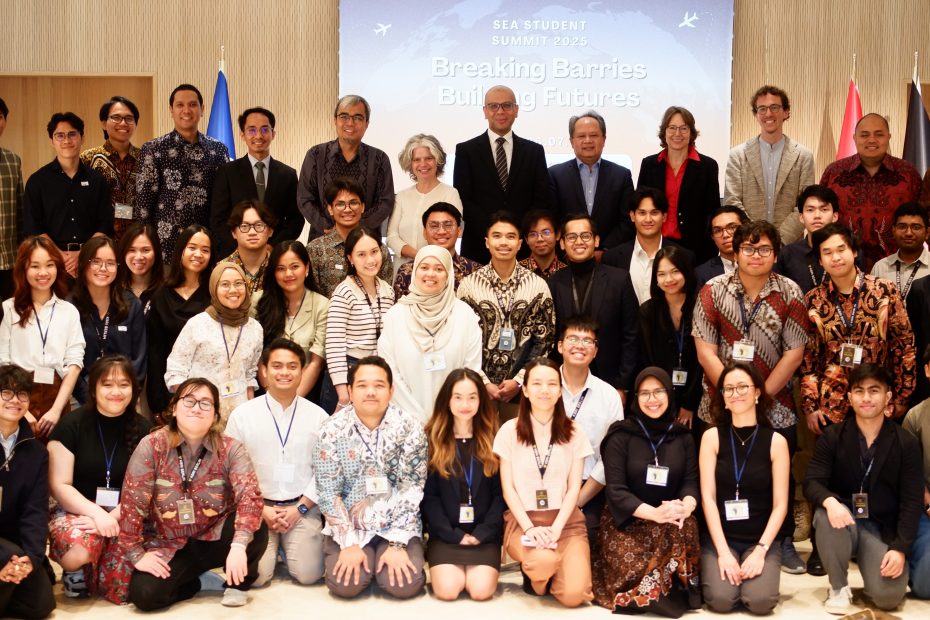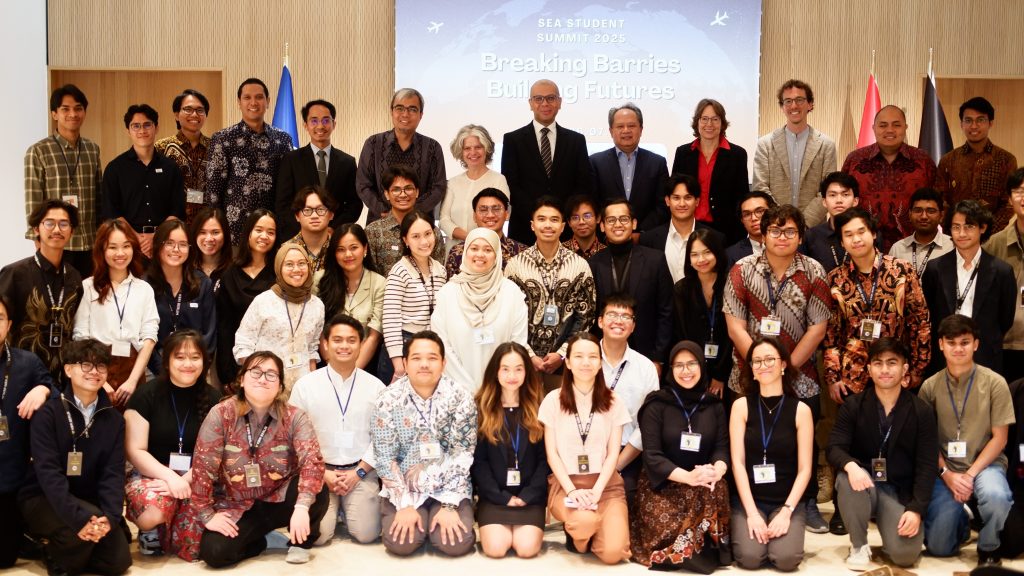
Reading time: 6 minutes
BERLIN – The Southeast Asia Student Summit 2025 successfully took place on June 26 2025, at the Embassy of the Republic of Indonesia in Berlin. The event was organized by Perhimpunan Pelajar Indonesia (PPI) Jerman, the Malaysia-German Students’ Society (MGSS), Singapore Students’ Association of Germany, as well as PPI Halle and PPI Berlin-Brandenburg. The summit was made possible with the full support of the Indonesian and Malaysian Embassies in Berlin.
Bringing together over 40 participants from across Southeast Asia, the summit served as a vibrant platform for dialogue, collaboration, and shared vision among Southeast Asian students in Germany.
Opening Remarks: A Spirit of Unity
The summit opened with welcoming remarks by Muhammad Nur Ar Royyan Mas, President of PPI Jerman, who reflected on the historical relevance of the Bandung Conference, which was held 70 years ago in 1955, with the participation of over 29 newly independent nations in Asia and African continent. The Bandung spirit set the tone for the summit’s spirit of breaking boundaries.
Following this, Aneesa Batrishia Binti Hairizam, President of MGSS, emphasized the strength of united identity and the importance of unity among Southeast Asian youth. It was brought to the fore that a summit such as the one we created promoted a platform for positive growth within the youth, which could help shape the future of the Southeast Asian youth. Rozaime Mohamed Desa, Charge d’Affaires of the Malaysian Embassy, reaffirmed his full support and expressed a desire to see similar events take place more frequently. Fajar Wirawan Harijo, Charge d’Affaires of the Indonesian Embassy, underlined the summit’s message with a poignant reminder: “We are here to build bridges.” This message crystallized well into the back of the mind of participants throughout the summit.
1st Session: Sustainable Innovation in ASEAN & EU through Smart Cities
The first panel of the day explored the theme of Smart Cities, moderated by Wan Muhammad Farhan. Enoch Tabak, Advisor for the International Smart Cities Network (ISCN) of the Deutsche Gesellschaft für Internationale Zusammenarbeit (GIZ) GmbH, shared insights into global smart city approaches and solutions. This entailed several practical perspectives, e.g. when describing how some of Tokyo’s digital infrastructure and advancement successfully balances innovation and digitization with accessibility for all age groups.
Joining virtually, Prof. Sulfikar Amir, an Associate Professor at Nanyang Technological University (NTU) Singapore, showcased his work with the government of Jakarta, Southeast Asia’s largest megacity, which has begun leveraging digital technologies to tackle recurring urban flooding and improve public services.
Both panelists placed a strong emphasis in utilizing the right amount of technology for the right use.
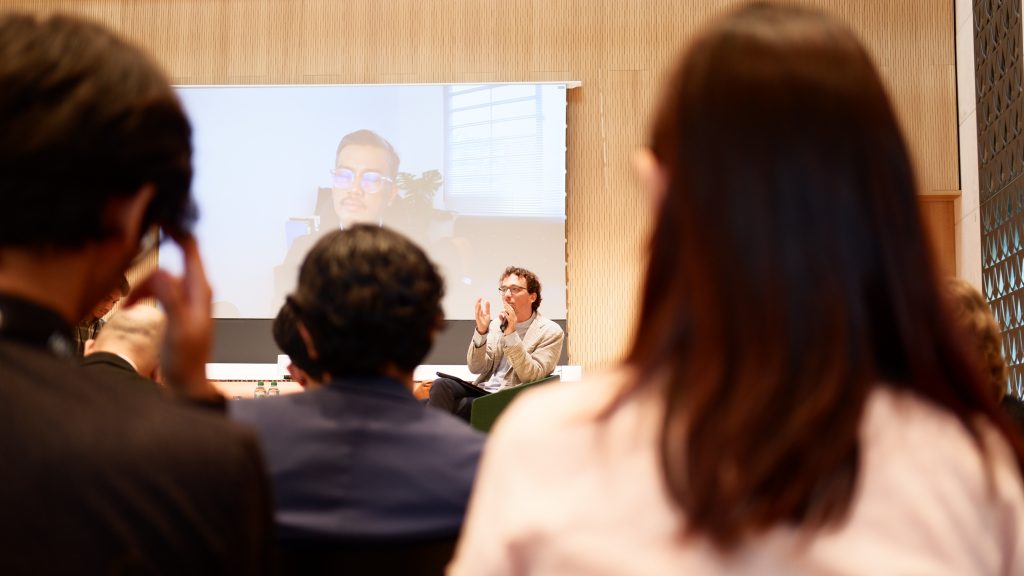
2nd Session: Empowering the Youth through Gender Equality towards Prosperity
The second session featured Katrin Bannach from the Friedrich Naumann Stiftung für die Freiheit (FNF), moderated by Annisa Ghina Savira. Though gender equality is not her primary focus in her professional works, Bannach, who studied sociology and gender studies, felt that the agenda is always dear to her. She spoke passionately about her concern regarding the shrinking civic space and its implications for gender parity.
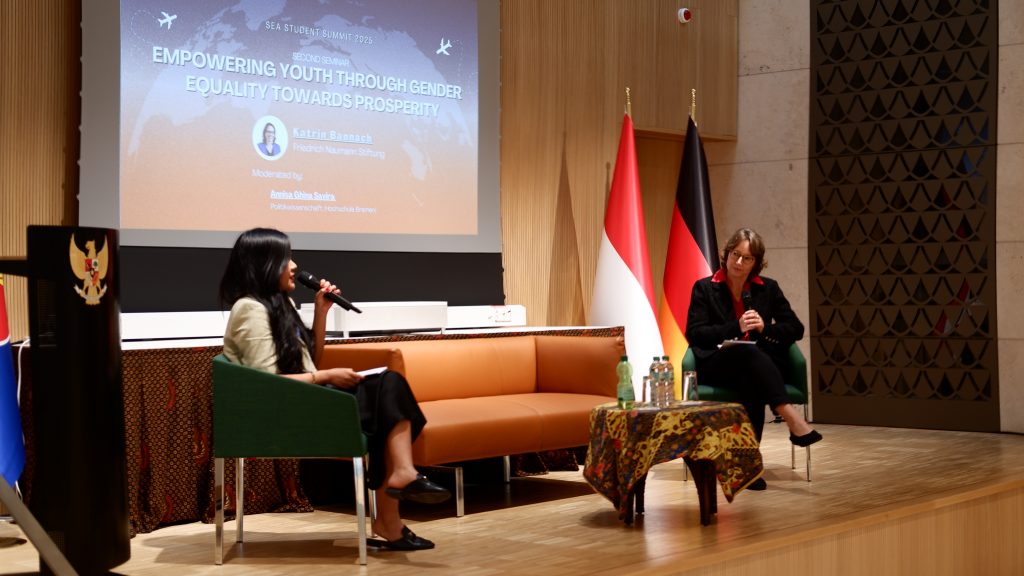
She stressed the need for both top-down policy change and changes according to our individual capacity, sharing how she encourages workplace flexibility for workers who bear family responsibilities. In response to questions about the phenomenon of childfree women, she asserted the importance of the rights of full autonomy for women, and also structural support, particularly around parental incentives. For her, when women had to delay bearing children due to the missing incentives provided by the government, it is not much of an individual choice anymore. She also voiced support for gender quotas in politics, although she strongly supported a merit-based approach in the workplace. In her view, companies can encourage gender parity in the selection process prior to interviews, which would still promote the values of gender equality.
In an impromptu addition towards the summit, FNF scholarship’s recipient Ajina Soeprapto shared her journey from studying law in Germany, working in the German Bundestag, to securing scholarship opportunities by FNF. Despite having no assistance from anyone while applying for the scholarship, the application process was smooth and self-explanatory. Adding to that, Ajina stressed that scholarship candidates must not have a tie with the aligning party of the political foundations such as FNF. In spite of this, she felt the values of the FNF foundations resonated well with hers. She encouraged students of all backgrounds to consider applying to FNF scholarships, which opens yearly.
3rd Session: Southeast Asian Perspectives in Germany
The final panel welcomed Boy Tri Rizky, Muhamamad Arief Husseini Bin Aman, and Grizelda Sng Yan Ning, from Indonesia, Malaysia, and Singapore, respectively. The topic of the panel is “Challenges of Diaspora Integration into German Society and Promoting Better Life Opportunities in Germany in the Current Political Landscape.”
Boy, who is currently pursuing a Ph.D at HU Berlin, highlighted the cultural diversity of Germany, despite a mismatch between his expectations of Germany prior to arriving. Arief, who once faced deportation but later returned and continued his studies, emphasized the vast opportunities Germany has to offer that were otherwise not available in his home country. Grizelda, who just recently came to Germany, expressed her eagerness to embrace her life in Germany after years of German language class during school years.
When asked about their future plans, Boy expressed his intent to return to Indonesia to contribute to his homeland, since he believes that his expertise in linguistics will be of use back in Indonesia. Arief remained open to staying longer in Germany despite not wanting to spend the rest of his life in Germany. While relatively new to Germany, Grizelda aspired to give back to her community in Singapore in the future.
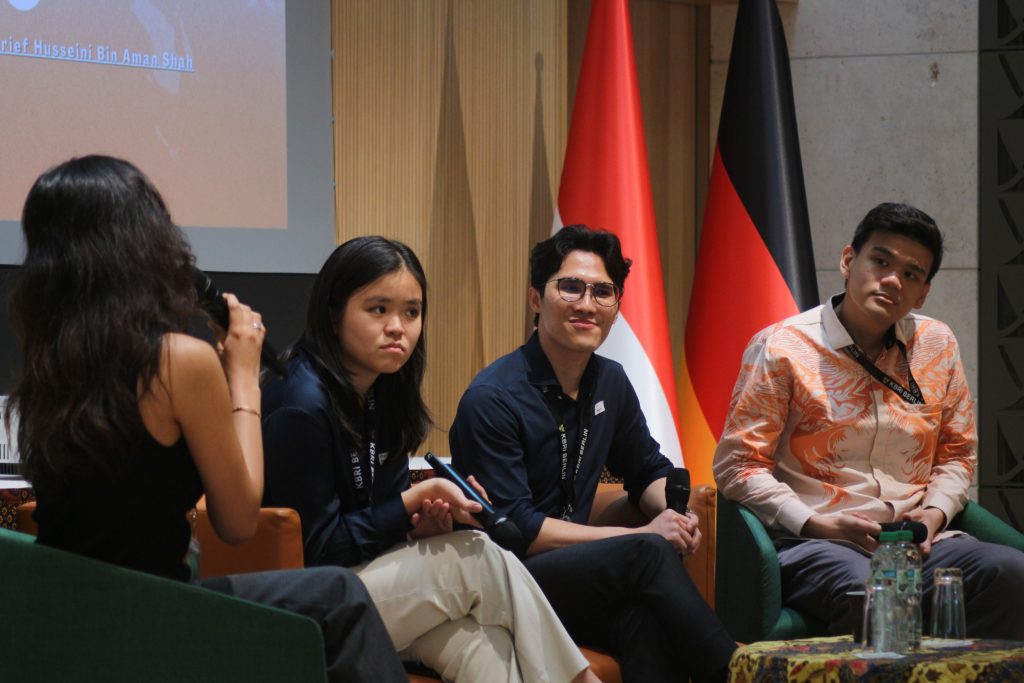
Group Discussions and Closing
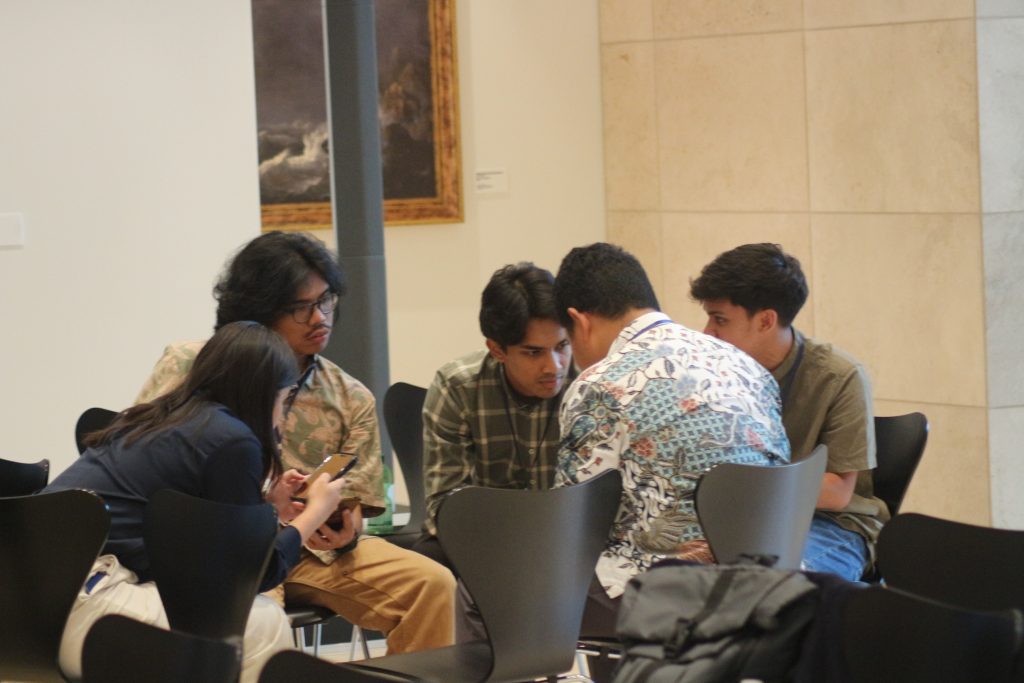
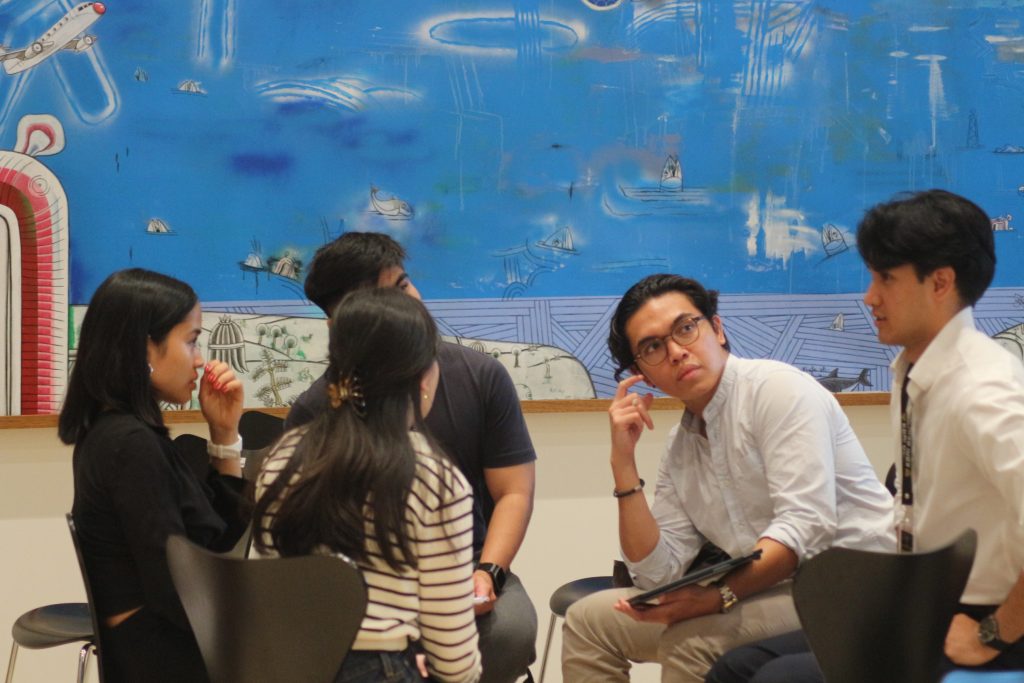
To close the summit, participants were divided into small working groups to discuss role-based challenges and presented their solutions related to the given questions. Despite the challenging questions, participants had much excitement while presenting their ideas and solutions, showcasing their analytical skills when imposed with tough questions reflecting real-world cases.
The Southeast Asia Student Summit 2025 provided a much-needed civic space for Southeast Asian students in Germany to network, exchange ideas, and engage with present issues that affect the region. With the positive energy and connections made during the summit, the organizers look forward to welcoming even more participants in the upcoming summit.
See you at the Southeast Asia Student Summit 2026!
Contributor:
Muhammad Nur Ar Royyan Mas
